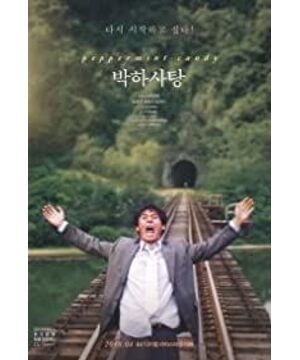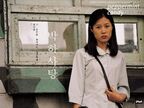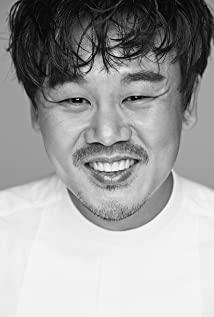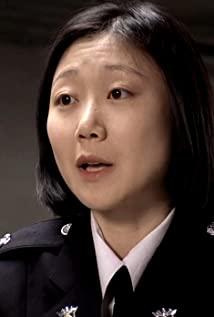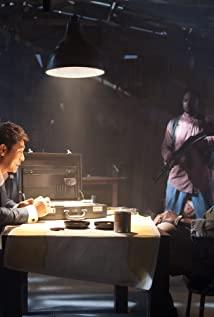From the perspective of the film, this article talks about the core of the mint, of course, it needs to be explored from the beginning of the sequential narrative in the film. The film uses flashbacks to reveal the tragic fate of Kim Yong-ho. From the whole film, the first tragedy is that Kim Yong-ho shot and killed a female student by mistake in the "Gwangju Incident" in 1980. Regardless of whether this female student participated in the student movement or not, in Jin Yonghao's heart, she is always an innocent member. And this "Gwangju Incident" made Jin Yonghao kill the life that should not be killed, thus making this mistaken killing the beginning of the "debt" of Jin Yonghao's life. This just reflects that the tragedy of the times falls on the individual's head and becomes the tragedy of the individual's destiny. No matter whether there are accidental factors in the formation of this kind of fate tragedy, it is inseparable from the special events of a specific era. The reason why this accidental killing is called "debt" is because Kim Yong-ho's personal kindness has never been extinguished. With a sentimental nature and a kind heart, he took away a young life with his own hands. This undoubtedly became a heavy guilt that could not be erased in his entire life, and he could never be forgiven by himself, just as this life could never return to the world. . When Jin Yonghao lived with this bad debt, the idea of "paying off the debt" would naturally arise in his mind. However, looking at the various things he has experienced since then-the "evil" things that have been promoted by his own choices and the factors of the times have forced him to be unable to "repay his debts". Being a police officer can be seen as his own choice to try to "pay off his debt", because the original intention of the police is to maintain justice. But it is precisely because of a specific era, the dictatorship of Chun Doo-hwan, that the police of that era became a tool to maintain the dictatorship. This is the era that forced his good-willed choice of trying to "repay the debt" into a new "bad debt", which made him more "debt" and extremely painful. Therefore, we can see the contradictory behavior of Jin Yonghao teaching minors not to sell themselves in the K bar. It is not only an exposure of his kindness, but also the shadow of the "self" when people are drunk, and the subconsciousness of "payment of debt" surfaced. Performance. With the advancement of the sequential narrative of the film, Jin Yonghao's "debt repayment" behavior has become less and less. Because the arm can't twist the thigh after all, even if those era clips are not positive, Kim Yong-ho cannot go against the flood as an individual. Therefore, he can only be "led by the nose" by a series of tragedies of the times. It seems that he is willing to degenerate year by year. In fact, it is just a "compromise" made by an ordinary citizen who is powerless in the face of the general situation in order to survive. But it is these "compromises" accumulated year by year that make Jin Yonghao's "debt" overstock, which has exceeded the bottom line that a person with a conscience can accept. So it caused the complete collapse of his beliefs, he Even if there is a 10,000 desire for redemption in his heart, there is no way to restore it. At this time, if Jin Yonghao is really down and down as we have seen, he will not fall into despair. . However, there is only one reason why this idea of atonement has been so deviated from reality and still exists - the nostalgia for the first love Yin Shunren. It is not so much a nostalgia, it is a debt, a "love debt". The beautiful and romantic time the two had had was rooted in Kim Yong-ho's heart as a seed of hope, but the seed failed to germinate in the end. It is also a beautiful memory that makes this "debt" play a role in spiritual support; this friendship has become the last trace of humanity for Jin Yonghao, a person who has almost lost his normal emotions and reason in the end - his pity for himself. In the plastic greenhouse, his explanation of his harsh living environment in front of outsiders is a manifestation of self-esteem. Even though he has been dealt with weakly by the director, he can still vaguely feel that this person still has life. And when he tried to find his ex-wife to see his daughter, his eyes in the crack of the door were the word "survival". He said that he wanted to drag someone to death, which was a more direct expression of his unwillingness and self-pity. His consideration of who to choose to die with can also be seen as a sign that his determination to commit suicide is not firm enough, and his situation at the time was not enough to make him "ruthless" against himself. But as Jin Yonghao learned that his first love was critically ill, he really no longer had a "life", and he no longer felt sorry for himself, who was heavily in debt. The method of suicide by lying on the track has no room for recovery and survival. It is a real "ruthless hand". Besides the image of the train, it is not difficult to associate it with the advancement of the times. The wheel of the times pulled by steel rods can easily crush all the people and things that have not been able to run the times - not to mention Jin Yonghao, who is bent on "paying off his debts" and trying to do good in the era of evil? The era of constant evil made Kim Yong-ho burdened with unrepayable sins, which led to the collapse of his beliefs and the death of his personality, making him cry "I want to go back" to perish. What about most people in reality at the time? Their lives must not be as dramatic as a movie, they can only choose to forget their sins and move on with their lives. And this movie has told us with a more extreme story ending, those sins will not be truly forgotten, and the pain will always be with everyone who has come from that time. To explore the core of the film from the perspective of the film creator, it is of course necessary to start from the director himself. Li Changdong himself is the one who has experienced all the events involved in "Mints", and his profound feelings for this dark period are self-evident. plum Most of Cangdong's short stories are inseparable from one theme: the influence of the times. The short stories included in "Burning Paper" and "Luchuan Have Lots of Dung", and most of them are about the impact of special times on society. Therefore, his "Mints", which obviously has many historical events, will naturally not deviate from the theme he always likes to consider. This film is not just about Kim Yong-ho's story. Looking at the times, Kim Young-ho is essentially the epitome of the inner commonality of Li Changdong's generation. For the sake of the story, many details are added to enrich the whole character. People who have come from that era, why can't they see those mistakes in history? Even if you don't see it at the time, you will surely reflect on it in the future. It's just that they chose to bury them in their hearts - the director himself must be the same. Jin Yonghao is the externalization of these people's hearts, but the reality is not all reality, there is still "cruel idealization". The reason why I say this is because most people who are more or less "indebted" like Kim Yonghao will inevitably have the idea of going back to the past for a moment, but almost no one will really die, they would rather live with pain. go down. On the contrary, Kim Yong-ho is decisive and his approach is very extreme. There is no doubt that as a director Li Cangdong, no matter in those short literary works in the past or in this "Mint Candy", he is more or less pouring his "bitterness of the times", and he also upholds his one of the author and director. Features: Express yourself.
View more about Peppermint Candy reviews


